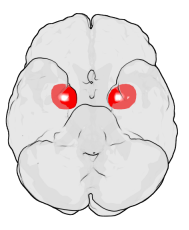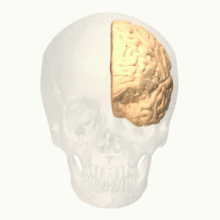This is an old revision of this page, as edited by Krakatoa (talk | contribs) at 21:33, 19 April 2012 (→Persistance of patterns: - change "Persistance" to correct "Persistence"). The present address (URL) is a permanent link to this revision, which may differ significantly from the current revision.
Revision as of 21:33, 19 April 2012 by Krakatoa (talk | contribs) (→Persistance of patterns: - change "Persistance" to correct "Persistence")(diff) ← Previous revision | Latest revision (diff) | Newer revision → (diff)

A growing number of studies find physiological differences in populations correlated with their group political orientation.
Brain Studies
Structural differences
Nature Neuroscience in 2007 reported a study by scientists at New York University and UCLA that showed that political orientation is related to differences in how the brain processes information. According to UCLA neurologist Dr. Marco Iacoboni, the study showed "there are two cognitive styles -- a liberal style and a conservative style." The article "Neurocognitive correlates of liberalism and conservatism" published in Nature Neuroscience "found that greater liberalism was associated with stronger conflict-related anterior cingulate activity, suggesting greater neurocognitive sensitivity to cues for altering a habitual response pattern."
According to a 2011 study by cognitive neuroscientist Ryota Kanai's group at University College London published in Current Biology, people with different political views have different brain structures. The scientists performed MRI scans on 90 volunteer young adult people's brains. According to ABC, "Scans revealed that the liberal students tended to have a larger region of the brain that processes conflicting information. That, say the authors, might make for tolerance to uncertainty in more liberal views. The conservatives tended to have a larger part of the brain that processes fear and identifies threats. They might be more inclined to integrate conservative views into their politics." The results of the study showed that conservatives had a larger amygdala, an almond-shaped structure of brain involved in processing memory of emotional reactions. Liberals had increased grey matter in the anterior cingulate cortex, a comma-shaped structure of the brain that plays a role in a wide variety of autonomic functions, such as regulating blood pressure and heart rate, as well as rational cognitive functions, such as reward anticipation, decision-making, empathy and emotion. As a result of these structural differences, liberals may be more efficient at managing conflicting information, while conservatives may be more efficient at recognizing threats. The researchers concluded, "It's very unlikely that actual political orientation is directly encoded in these brain regions." Kanai also warned: "More work is needed to determine how these brain structures mediate the formation of political attitude."
In an earlier fMRI study published in Social Neuroscience, three different patterns of brain activation were found to correlate with individualism, conservatism, and radicalism. In general, fMRI responses in several portions of the brain have been linked to viewing of the faces of well-known politicians. Others believe that determining political affiliation from fMRI data is overreaching.
Political genome studies
A Genome-Wide Analysis of Liberal and Conservative Political Attitudes by Peter K. Hatemi et al traces DNA research involving 13,000 subjects. The study identifies several genes potentially connected with political positions.
Functional assays
According to the ASA, IQ data from the "Add Health" survey averaged 106 for adolescents who self-identified as "very liberal", versus 95 for those calling themselves "very conservative". An unrelated study in 2009 found that among students applying to U.S. universities, conservatism correlated negatively with SAT, Vocabulary, and Analogy test scores though there was a greater correlation with economic differences. A 2012 study concluded that "In an analysis of two large-scale, nationally representative United Kingdom data sets (N = 15,874), we found that lower general intelligence (g) in childhood predicts greater racism in adulthood, and this effect was largely mediated via socially conservative ideology. A secondary analysis of a U.S. data set confirmed a predictive effect of poor abstract-reasoning skills on antihomosexual prejudice, a relation partially mediated by both authoritarianism and low levels of intergroup contact."
Cecil Adams of The Straight Dope disputed claims that Democratic-leaning states of the United States are smarter on average than Republican-leaning states, noting that a study published in The Economist in 2000 was a hoax, and a 2006 study by Satoshi Kanazawa was grossly flawed by failing to note that students in Southern states who did not take the SAT scholastic test were often taking the competing ACT exam instead.
In research conducted by University of Virginia psychologist Jonathan Haidt regarding moral stereotypes in politics, conservatives and moderates were adept at guessing how liberals would answer questions, while liberals, particularly those who described themselves as "very liberal", were least able to guess how the conservatives would answer.
In a survey of the perceived severity of moral transgressions, conservatives were more affected by the taste of a bitter drink than liberals. "...taste perception significantly affected moral judgments, such that physical disgust (induced via a bitter taste) elicited feelings of moral disgust. Further, this effect was more pronounced in participants with politically conservative views".
Persistence of patterns
A study by scientists at New York University and the University of California, Los Angeles found differences in how self-described liberal and conservative research participants responded to changes in patterns. Participants were asked to tap a keyboard when the letter 'M' appeared on a computer monitor and to refrain from tapping when they saw a 'W.' The letter 'M' appeared four times more frequently than W, conditioning participants to press the keyboard on almost every trial. Liberal participants made fewer mistakes than conservatives when they saw the rare W, indicating to the researchers that these participants were better able to accept changes or conflicts in established patterns.
The participants were also wired to an electroencephalograph that recorded activity in their anterior cingulate cortex, the part of the brain that detects conflicts between a habitual tendency and a more appropriate response. Liberals were significantly more likely than conservatives to show activity in the brain circuits that deal with conflicts during the experiment, and this correlated with their greater accuracy in the test.
See Also
References
- ^ David M Amodio, John T Jost, Sarah L Master & Cindy M Yee, Neurocognitive correlates of liberalism and conservatism, Nature Neuroscience. Cited by 69 other studies
- Study finds left-wing brain, right-wing brain - latimes.com
- R. Kanai; et al. (2011-04-05). "Political Orientations Are Correlated with Brain Structure in Young Adults". Curr Biol. 21 (8): 677–80. doi:10.1016/j.cub.2011.03.017. PMID 21474316.
{{cite journal}}: Explicit use of et al. in:|author=(help) - Is Your Brain Liberal or Conservative? - FoxNews.com
- Left brain, right brain: researchers link neurology to political orientation
- ^ Liberal vs. Conservative: Does the Difference Lie in the Brain? – TIME Healthland
- ^ Political Orientations Are Correlated with Brain Structure in Young Adults Ryota Kanai, Tom Feilden, Colin Firth and Geraint Rees. Science Direct
- Amunts K, Kedo O, Kindler M, Pieperhoff P, Mohlberg H, Shah N, Habel U, Schneider F, Zilles K (2005). "Cytoarchitectonic mapping of the human amygdala, hippocampal region and entorhinal cortex: intersubject variability and probability maps". Anat Embryol (Berl). 210 (5–6): 343–52. doi:10.1007/s00429-005-0025-5. PMID 16208455.
{{cite journal}}: CS1 maint: multiple names: authors list (link) - Zimbardo begins Heroic Imagination Project, Stanford Daily, Jan 7, 2011
- Decety, J., & Jackson, P.L. (2004). "The functional architecture of human empathy. Behavioral and Cognitive Neuroscience Reviews". 3: 71–100.
{{cite journal}}: Cite journal requires|journal=(help)CS1 maint: multiple names: authors list (link) - Jackson P.L., Brunet E., Meltzoff A.N., Decety J. (2006). "Empathy examined through the neural mechanisms involved in imagining how I feel versus how you feel pain: An event-related fMRI study". Neuropsychologia. 44: 752–61. doi:10.1016/j.neuropsychologia.2005.07.015.
{{cite journal}}: CS1 maint: multiple names: authors list (link) - The liberal brain? Scans show liberals and conservatives have different brain structures - New York Daily News
- ^ Politics on the Brain: Scans Show Whether You Lean Left or Right | Political Psychology | Liberals & Conservatives | LiveScience
- Zamboni G, Gozzi M, Krueger F, Duhamel JR, Sirigu A, Grafman J (2009). "Individualism, conservatism, and radicalism as criteria for processing political beliefs: a parametric fMRI study". 4 (5): 367–83. doi:10.1080/17470910902860308. PMID 19562629.
{{cite journal}}: Cite journal requires|journal=(help)CS1 maint: multiple names: authors list (link) Zamboni G, Gozzi M, Krueger F, Duhamel JR, Sirigu A, Jordan Grafman. National Institutes of Health, Bethesda, MD, USA - Kristine Knudson; et al. (2006-03). "Politics on the Brain: An fMRI Investigation". PubMed preprint (Soc Neurosci). PMC 1828689. PMID 17372621.
{{cite journal}}: Check date values in:|date=(help); Cite journal requires|journal=(help); Explicit use of et al. in:|author=(help) - Aue T, Lavelle LA, Cacioppo JT (2009). "Great expectations: what can fMRI research tell us about psychological phenomena?". 73 (1): 10–6. doi:10.1016/j.ijpsycho.2008.12.017. PMID 19232374.
{{cite journal}}: Cite journal requires|journal=(help); Unknown parameter|month=ignored (help)CS1 maint: multiple names: authors list (link) - Genome-Wide Analysis of Liberal and Conservative Political Attitudes Peter K. Hatemi United States Studies Centre, University of Sydney and Queensland Institute of Medical Research, Nathan A. Gillespie Virginia Institute for Psychiatric and Behavioral Genetics, Lindon J. Eaves Virginia Institute for Psychiatric and Behavioral Genetics, Brion S. Maher Virginia Institute for Psychiatric and Behavioral Genetics, Bradley T. Webb Virginia Institute for Psychiatric and Behavioral Genetics, Andrew C. Heath Washington University St. Louis, Sarah E. Medland Queensland Institute of Medical Research, David C. Smyth Queensland Institute of Medical Research, Harry N. Beeby Queensland Institute of Medical Research, Scott D. Gordon Queensland Institute of Medical Research, Grant W. Montgomery Queensland Institute of Medical Research, Ghu Zhu Queensland Institute of Medical Research, Enda M. Byrne Queensland Institute of Medical Research, Nicholas G. Martin Queensland Institute of Medical Research, The Journal of Politics, Vol. 73, No. 1, January 2011, Pp. 1–15 ISSN 0022-3816 "The under-standing that we cannot yet accurately map howgenes influence brain processes and biological mech-anisms which in turn interact with our upbringing,social life, personal experience, the weather, diet, etc,to somehow be expressed in part as a Conservative-Liberal orientation, is the exact reason that genome-wide analyses are valuable and necessary for politicalscience.
- "Intelligent People Have "Unnatural" Preferences and Values That Are Novel in Human Evolutionary History". American Sociological Association press release. 2010-02-23.
- Satoshi Kanazawa (2010). "Why Liberals and Atheists Are More Intelligent". Social Psychology Quarterly. doi:10.1177/0190272510361602.
- "Liberals and Atheists Smarter? Intelligent People Have Values Novel in Human Evolutionary History, Study Finds". ScienceDaily. 2010-02-24.
- Elizabeth Landau (2010-02-26). "Liberalism, atheism, male sexual exclusivity linked to IQ". CNN.
- "Higher IQ linked to liberalism, atheism". UPI. 2010-03-02.
- Nicole Baute (2010-03-01). "Are liberals and atheists smarter? Psychologist links teen IQ levels with adult views on religion, politics and family". Toronto Star.
- Larry Stankov (2009-05). "Conservatism and cognitive ability". Intelligence. 37 (3): 294–304. doi:10.1016/j.intell.2008.12.007.
{{cite journal}}: Check date values in:|date=(help) - Gordon Hodson and Michael A. Busseri (2012-01-05). "Bright Minds and Dark Attitudes: Lower Cognitive Ability Predicts Greater Prejudice Through Right-Wing Ideology and Low Intergroup Contact". Psychological Science: (early online publication).
- Stephanie Pappas (2012-01-26). "Low IQ & Conservative Beliefs Linked to Prejudice". LiveScience.
- Cecil Adams (2012-01-20). "Are blue states smarter than red states?". The Straight Dope.
- Nicholas D. Kristof (2012-03-22). "Politics, Odor and Soap". The New York Times.
{{cite web}}: Missing or empty|url=(help); Unknown parameter|urlhttp://www.nytimes.com/2012/03/22/opinion/kristof-politics-odors-and-soap.html?_r=ignored (help) - Eskine KJ, Kacinik NA, Prinz JJ (2011). "A bad taste in the mouth: gustatory disgust influences moral judgment". 22 (3): 295–9. doi:10.1177/0956797611398497. PMID 21307274.
{{cite journal}}: Cite journal requires|journal=(help); Unknown parameter|month=ignored (help)CS1 maint: multiple names: authors list (link) - "Brains of Liberals, Conservatives May Work Differently". Psych Central. 2007-10-20.
- "Study finds left-wing brain, right-wing brain". Los Angeles Times. 2007-09-10.